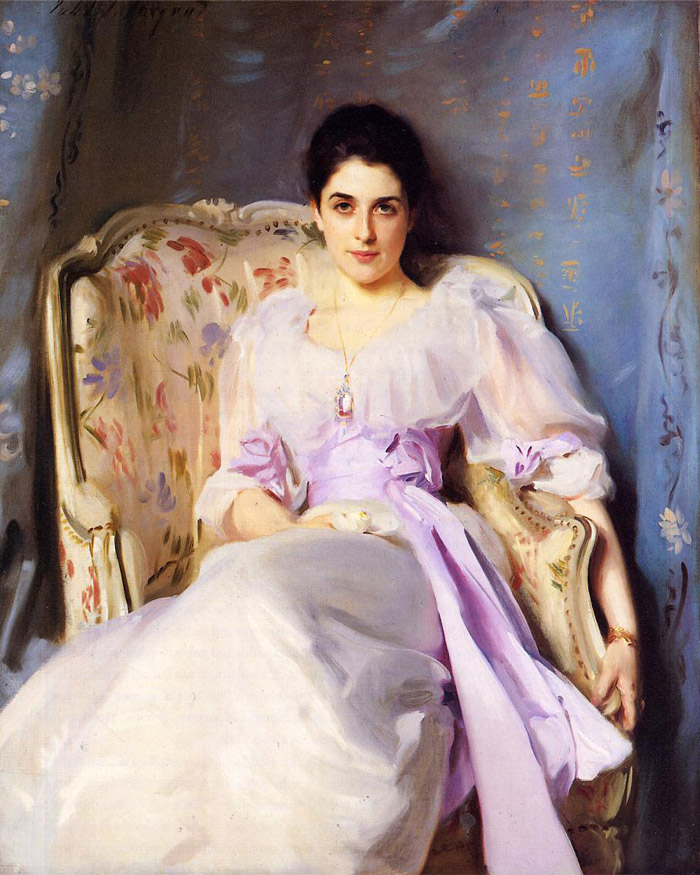Painting by John Singer Sargent
Assignment #1
Choose one of the questions below for your essay response, or discuss another topic of interest based on our class’ literary readings.
1) The essence of Faust's pact with the devil Mephistopheles is to live each moment to the fullest and to let it pass; Mephistopheles will serve Faust so long as the latter constantly strives and remains unsatisfied with anything the devil has to offer, that is, with anything the world alone has to offer. Is Faust a hero?
2) German Romantic writers emphasized the contradictory tension between the necessity of desire and the impossibility of its gratification. They had a craving for the infinite, and this love of infinity led them to the love of the night; a favorite Romantic symbol for infinity is endless night, the distant stars, and the Milky Way. One such writer, Novalis, felt that “the eyes of the night look into the depths of the universe.” The whole restless rhythm and eternal striving of Faust's life – which demonstrates the value of the infinite - is clearly Romantic. Analyze this theme in Goethe's great epic poem.
3) Goethe draws on many works in the Western literary tradition in shaping the issues he raises in Faust. Compare his treatment of the relationship between God and Satan in conversation with the opening chapters of Job; or, compare Goethe’s Mephistopheles with John Milton’s Satan.
4) When Margaret enters the play, its emphasis changes. Neither great beauty nor great intelligence is assigned her; she epitomizes virtue but falls easily to Faust. What is her function in the play?
5) Readers have often noted the absence of a real evil nature in Mephistopheles; at no point does he actually perform any evil deed, and for a great part of the poem, he appears as a witty, funny, sharp-sighted man whose function, like a good conscience, is to bring Faust to face facts and to make him face responsibility for his actions. How do you feel toward Mephistopheles? Do your feelings change? If so, when and why?
6) Think of Goethe’s Faust in a modern-day context: is man capable of developing conscious insight into the spiritual laws of nature and the human soul, insight for which Faust yearns, or is he condemned to remain a prisoner of mechanistic science, “eating dust” for Mephistopheles? Is man a being of innate spiritual worth and capable of unfolding what is called “genius”, or is he a creature completely determined and beyond freedom and dignity?
7) Margaret is Goethe's original and most influential addition to the Faust legend. Like Werther's Lotte, she disappears as an individual in the plethora of emotions and ideals Faust projects onto her; her tragedy is that she doesn't exist in the face of Faust's subjectivity. Compare/ contrast the female figures in Goethe's works.
8) Early German Romanticists, who became of age in the 1790s, argued that we have an innate spiritual sense: a power of contemplation or intellectual intuition, which transcends our reason and allows us to be at one with ourselves, others, and nature. This unity and harmony was inevitably and tragically torn apart by the development of civilization. For these young romantics, there were 3 forms of alienation: division within the self, which was essentially a conflict between reason and sensibility, where the self must repress or eradicate its desires and feelings to act on its duty; division between the self and others, which arose from the decline of the traditional community as a result of the rise of the competitive marketplace, where individuals sought their self-interests at the expense of others; and division between the self and nature, which arose from the advancement of modern technology that made nature into a mere tool or instrument to be controlled for human benefit, lacking any magic, mystery, or beauty after science had demystified it. Discuss these Romantic themes in relation to The Sorrows of Young Werther.
9) Goethe's Werther suffers the misfortune of falling in love with a married woman, and in that lies his great tragedy. Some critics see Werther as a victim of love, while others think he loves being a victim. Is Werther a victim of love, of bourgeois culture, or of himself? Is he a victimizer, hypocritical, aggressive, and spoiled? Are you sympathetic to his character?
10) Sentimentality and egoism affect Werther in his happier moments, as when he is playing with children, refusing to acknowledge class distinctions between himself and the peasantry or nobility, offering aid to the poor, or attempting to be just to his enemies and his rival Albert. Goethe's protagonist is over-conscious of himself, and in the consciousness – perhaps ego-centered self-consciousness - of his love for Lotte, is he really worshipping himself when he writes to his friend about these events?
11) Romantic era writers have been grouped together around certain essential concepts: imagination, liberty, and individualism. Is Romanticism an intellectual movement or a set of conscious responses to social and political upheavals?
12) In his epic poem Paradise Lost, Milton recounts the story of the revolt of Satan and his banishment from Heaven, and the Fall of man and his expulsion from Eden. Compare the Adam and Eve in Genesis to their counterparts in Milton's epic work.
13) Satan is often considered to be the epic hero of Paradise Lost. Throughout the text, Milton's God is described as a tyrant, whereas Satan is a compassionate leader of the underdog. Regretting his actions, Satan feels ashamed of his vain boast to subdue God and laments that Adam and Eve have found happiness in Eden, while Hell is his prison. His evil intentions result from exclusion rather than callous apathy. Satan appears more emotional and less conniving than the devil of biblical renown and assumes a heroic position in early modern works, primarily because he encourages individuality and because people could identify with his conflicted desires and personality flaws (his willfulness, courage, and endurance dwindle in the long run to “ire, envy, and despair”). Do you feel sympathetic to Milton's Satan?
14) Byron drew on a wide field of reading as an inspiration to his dark, dramatic poem “Manfred”: Goethe's Faust, Hamlet, and Milton's Satan.
Like Milton's devil, the larger than life anti-hero of Paradise Lost, Byron's protagonist chastises the sun and possesses a paradoxical nature of darkness and light. Both characters create a hell within themselves. Compare/ contrast Milton's and Byron's anti-heroes.
OR
Discuss the similarities between Goethe's Faust and Byron's Manfred.
15) The Byronic hero's literary descendants populated literature during the 1800's: Mary Shelley's Victor Frankenstein, Emily Bronte's Heathcliff, Charlotte Bronte's Rochester, and Oscar Wilde's Dorian Gray were all, in their ill temper, egocentrism, and intense, self-consuming passion, identifiably Byronic. Examine the Byronic hero in relation to any of the protagonists from our readings.
16) By rejecting hypocritical bureaucracy and society’s conventions, one can maintain their individual identity. Although rebellion is a way to protect one’s individuality, it can also result in solitude and alienation. Byron’s Manfred is a social outcast who is self-reliant in his isolation, though driven toward an inevitable doom. Is Manfred tormented as much by his own past misdeeds as he is by society’s inability to accept and to understand him?
Goethe's Werther refuses to adhere to the rules and conventions of work and society, yet he wants to be accepted and respected by the same people he so thoroughly despises; recall the painful social humiliation he suffers due to his modest social rank at an aristocratic reception in Book II. Although Werther – whose name means “worthy one” - protests against social prejudices and privileges, he counts some aristocrats among the people whom he most admires.
Do the external struggles of some of these protagonists begin as inner struggles against themselves? Are their struggles against social and bureaucratic restraints essentially battles between freedom and oppression? If they do achieve spiritual self-assertion, are they ultimately defeated when they challenge the social order?
17) Compare Byron's hero with Mick Jagger's image of the sympathetic Satan; is Jagger's image indirectly derived from Byron? You are encouraged to quote from Jagger's songs.
You are not required to include outside research for this essay. Your paper should be 6 – 7 typed, double-spaced pages. Remember to support your opinions by reference to the texts, and be sure to quote passages from the literary texts.


